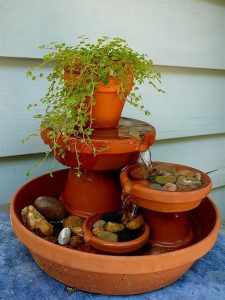Last Updated on October 19, 2023 by teamobn
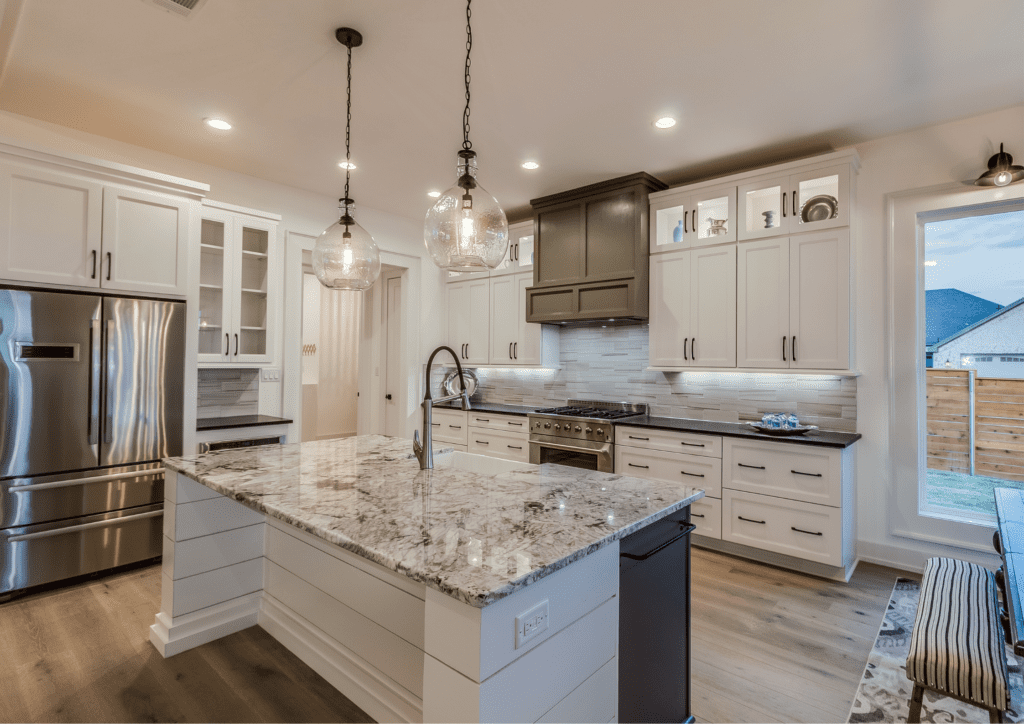
Every kitchen deserves a standout countertop. It’s not just a work surface; it’s a focal point that ties the room together. Choosing the right one can elevate your kitchen’s style, functionality, and overall appeal. Below is our complete guide to finding the best cooking and dining space countertop.
Contents
Understanding Your Needs and Preferences
Before diving into the vast world of countertops, it’s crucial to understand what you truly need. Your kitchen is a personal space, and the countertop you select should align with your habits, style, and commitment to maintenance.
Assessing your kitchen’s usage
Think about your kitchen routines. How often are you whipping up meals, and what kind of meals are they? A durable and heat-resistant countertop can be vital if you frequently cook dishes. On the other hand, if baking is your passion, a smooth, excellent surface like marble might be perfect for rolling out dough and pastries.
Families often have different needs. If you have children, a spill-resistant and scratch-proof surface can be a lifesaver. Those who entertain guests frequently might prioritize a functional and aesthetically pleasing countertop.
Style preferences
Your countertop is a significant style statement in the kitchen. It sets the tone. Whether you lean towards contemporary or traditional, there’s a countertop for you. Bright colors or patterns appeal to those wanting a lively kitchen space. Meanwhile, neutral or natural finishes can create a more serene environment.
Keep in mind the bigger picture, too. Your countertop should complement other elements like cabinets, flooring, and appliances. Consider the overall cohesion of your kitchen design.
Budget considerations
Money matters when making decisions. Some countertops, like luxury marble or quartz, have a higher price tag. But they can offer unparalleled beauty and durability. Materials like laminate or tile are budget-friendly and stylish.
Always remember: it’s not just about the initial cost. Think about the long term, too. Some cheaper options require replacements sooner. Yet, pricier ones are a one-time investment with proper care.
Maintenance willingness
Every countertop has its own care routine. Some, like granite, require regular sealing to maintain their sheen and prevent staining. Others, like stainless steel, are easy to clean but might show every fingerprint and smudge.
It’s essential to be honest with yourself. If you do not want to spend time on regular maintenance, opt for a more low-maintenance option. Your future self will thank you for making a choice that aligns with your willingness to upkeep.
Selecting the right countertop goes beyond just looks. By understanding your preferences, you will find the perfect material for your kitchen.
Materials Overview
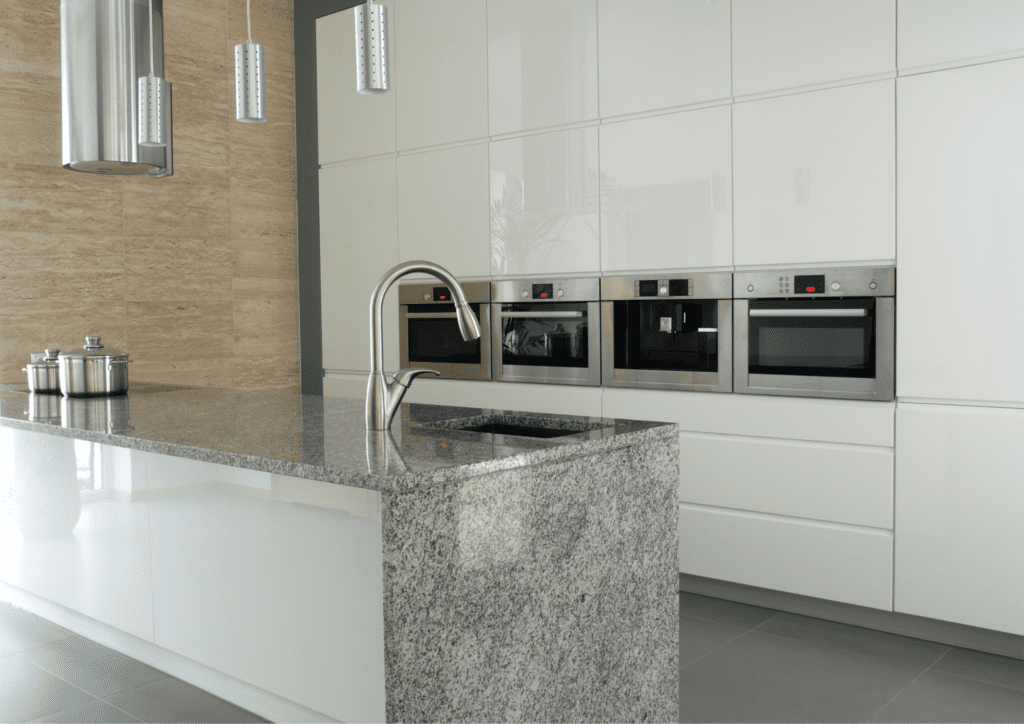
Selecting the ideal material for your kitchen countertop is like choosing the main character in a story. Each material carries its own set of strengths, nuances, and aesthetics. Below are the most common kitchen countertop materials in the market.
Granite
Granite has long been a favorite choice for countertops, revered for its natural beauty and toughness. Each slab boasts unique patterns, ensuring that no two countertops are identical. This stone is known for its heat resistance, making it an excellent surface for those who cook frequently. However, its porous nature can stain if spills aren’t promptly addressed.
Regular maintenance is key to keeping granite pristine. While it’s robust and durable, it’s essential to reseal it regularly. This will prevent potential staining and maintain its luster. When cared for, granite countertops can last for decades, serving as a timeless centerpiece in any kitchen.
Quartz
Quartz countertops are a blend of nature and innovation. They come from natural quartz crystals combined with resin. The combination results in a durable and non-porous surface. This unique composition means they don’t need sealing like granite and are resistant to stains and bacteria.
Design-wise, quartz offers a vast array of options. From patterns that mimic natural stones to vibrant, uniform colors, there’s likely a design to match any kitchen aesthetic. Its design flexibility and durability have made quartz popular for many homeowners seeking function and style.
Laminate
Laminate countertops have come a long way from the often-mocked styles of yesteryears. The material comes in different designs. Some laminates look like natural stones and others with modern patterns. One of the laminate’s significant benefits is its affordability. They are an excellent choice for those working within a tight budget.
Maintenance is relatively straightforward with laminate. It’s easy to clean and resists stains, but it’s crucial to be wary of high heat and sharp objects. Placing a hot pot directly on it or using it as a cutting board can cause damage that’s challenging to repair.
Marble
Marble exudes an undeniable elegance, immediately elevating the luxury feel of any kitchen. Its veins and swirls make each slab unique and artistic looking. Beyond its beauty, it’s a beautiful stone. Marble is perfect for rolling and kneading dough.
Yet, marble’s porous nature makes it susceptible to staining. Citrus and vinegar can leave behind long-lasting stains. Regular sealing can help prevent this problem. But it still requires prompt cleaning of spills to maintain its pristine appearance. Marble is a top choice for those willing to provide tender, loving care and keen on a luxurious touch.
Wood or Butcher Block
Wood countertops, called butcher blocks, have a rich, timeless appeal. Their tactile and warm nature infuses any kitchen with a sense of homeliness. Beyond aesthetics, wood is functional. Its surface is kind to knives, allowing direct chopping and cutting.
Yet, wood does ask for attention in return for its beauty. Spills, especially liquids, should be cleaned immediately to avoid stains or damage. Regular oiling lets you maintain its rich color and prevents drying or cracking.
Stainless Steel
When you think of professional, restaurant-quality kitchens, stainless steel often comes to mind. Its sleek and reflective surface delivers a modern and industrial vibe. Steel countertops are a favorite for those seeking a clean, minimalist look. One of its standout features is its non-porous nature, which makes this stain-resistant.
Despite its strength, stainless steel has its vulnerabilities. It’s prone to scratching, and over time, these scratches can accumulate to dull its shine. Fingerprints and smudges are also more visible so frequent wiping might be necessary. Yet, stainless steel remains a top contender for those prioritizing hygiene.
Concrete
Concrete countertops offer a unique blend of industrial charm and customization. This is one of the most adaptable materials. Concrete can be cast in any shape and dyed in various colors. It can also have stones, tiles, or shells for a one-of-a-kind look. Its solid nature means it’s durable.
Yet, the material is porous and susceptible to staining if not sealed. Regular resealing is necessary to maintain its appearance and prevent damage. Concrete can develop small cracks over time, which can look bad on your kitchen.
Tile
Tile countertops are a mosaic of versatility and style. You have so many ways to showcase your personality with tiles. The design possibilities are endless. There are ceramic and porcelain as well as small mosaics and large slabs. Since tiles come in many pieces, you can replace damaged ones, not the entire countertop.
Yet, the grout lines between tiles can pose challenges. They can be prone to staining and accumulate food particles if not cleaned. Regular cleaning and occasional regrouting are necessary. For those drawn to the flexibility of design and the classic appeal, tiles are a good choice.
Recycled Materials
Recycled countertops are a choice, combining sustainability with style. The material comes from a glass, porcelain, and even paper blend. These countertops present a unique and varied aesthetic. Depending on the materials used, the resulting surface can shimmer with colored glass. Other recycled countertops have a subdued and solid appearance.
While these countertops champion sustainability, they don’t skimp on durability. Many recycled surfaces are non-porous and can stain easily. Following the manufacturer’s guide, ensure the recycled countertop lasts long.
Porcelain
Porcelain countertops have gained traction due to their beauty, resilience, and low-maintenance blend. Popular in Europe, these countertops come from natural clay. Tile makers bake the clay at very high temperatures to make them durable. Their sleek appearance can mimic various finishes. There are porcelain with polished marble or rustic stone looks.
Omit maintenance, and porcelain is a winner. It’s resistant to scratches, heat, UV rays, and stains. It is non-porous and doesn’t need sealing, and its surface is easy to clean. One potential drawback is its vulnerability to chipping on the edges. Extra care is needed, especially in high-traffic areas.
Your kitchen’s countertop is more than a surface. It’s a stage where daily life unfolds. This is where morning coffee rituals and midnight snack adventures happen. As you explore the material options, reflect on which aligns most with your lifestyle.
Installation Considerations
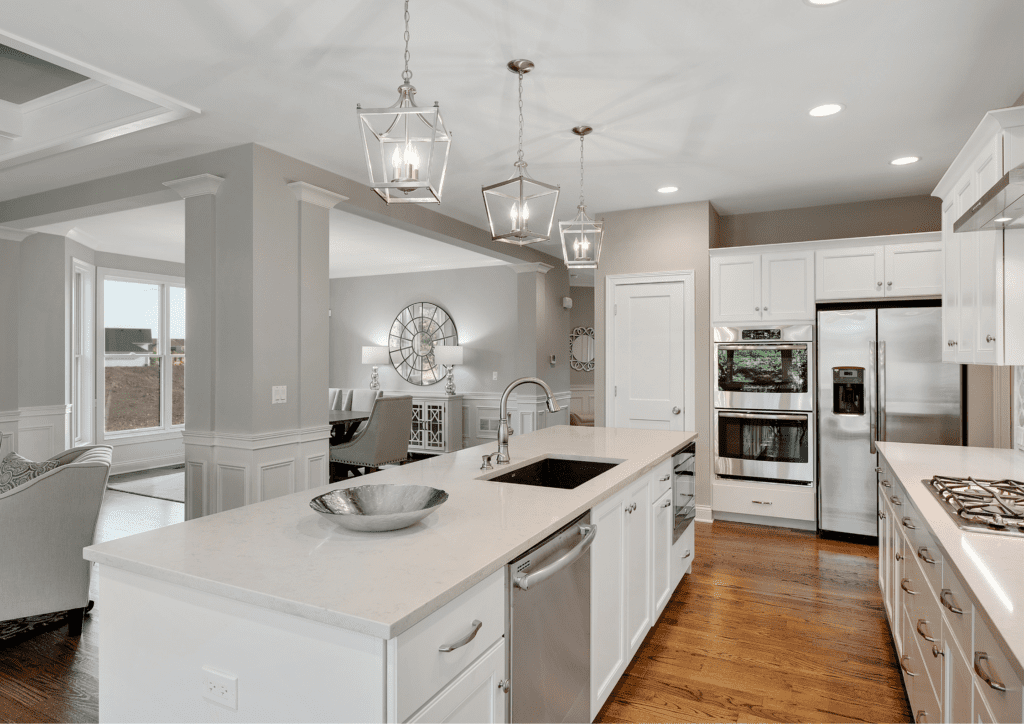
DIY vs. Professional Installation
Deciding between a DIY project or entrusting it to a professional is a decision shaped by cost, skill, and the desire for perfection.
Pros of DIY:
- Cost Savings: Doing it yourself can save on labor costs, which can sometimes be a significant portion of the installation expense.
- Personal Satisfaction: There’s a sense of accomplishment in completing a home project to match your style.
- Flexible Timing: You can work on the project at your own pace without having to align with a professional’s schedule.
Cons of DIY
- Risk of Mistakes: Without experience, there’s a higher potential for errors, which can be costly.
- Time-Consuming: Without professional tools and expertise, the project can take longer than anticipated.
- Potential for Waste: Incorrect measurements or mishandling can lead to material waste, offsetting savings.
Pros of Professional Installation
- Expertise: Professionals bring experience, ensuring the job is done right the first time.
- Efficiency: The installation can be faster with specialized tools and a skilled team.
- Warranty: Many professional installations come with a guarantee, offering peace of mind.
Cons of Professional Installation
- Cost: Hiring experts is undeniably more expensive than a DIY approach.
- Scheduling: You must align with the professional’s availability, which might not always be convenient.
- Less Personal Involvement: Some homeowners enjoy being hands-on; with professionals, you’re more of an overseer.
Time involved
Installation time varies based on material and complexity. Laminate or tile might take a weekend for a DIY enthusiast. Other materials like granite or quartz require more time if you do it yourself. Remember, it’s not just about placing the countertop. There’s the removal of the old one, possible adjustments, and the curing or setting time. Factor in these elements when planning your kitchen’s downtime.
Potential pitfalls and things to watch out for
Each countertop material and installation type has its own set of challenges. For instance, precise measurements are crucial; a slight error can mean a slab that doesn’t fit. Heavy materials like granite or marble can break if not handled. Some countertops might need leveling to avoid unexpected issues with cabinets beneath.
Another concern is the finishing touches. Seams need careful alignment for a clean look. Not having the right tools or materials can halt the process mid-way.
Always research your chosen material’s specific needs and pitfalls. Prepare to take the task on yourself or oversee a professional’s work.
Installation is the final step in your countertop project. Bridging your selection to everyday use in your home. Whichever route you choose, thorough research and preparation are key. A well-installed countertop is a testament to your love for your kitchen.
Tools for Countertop Selection and Maintenance
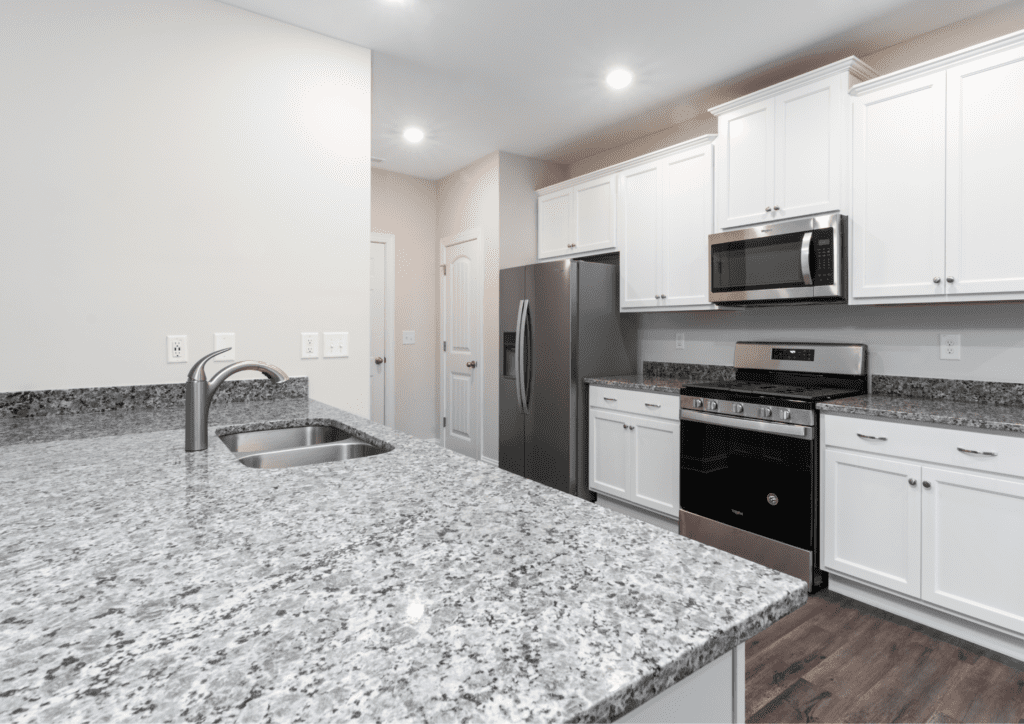
Choosing the right countertop requires careful thought and the right set of tools. Let’s explore the essential tools you need on this journey.
Measurement tools
Accurate measurements are foundational when it comes to countertops. It ensures a perfect fit and prevents unexpected adjustments or wastage.
Tape measures
The staple of measurement is tape measures. Their features range from durable builds to magnetic tips for solo measurements. They offer a practical method to gauge the distances of each countertop material.
Right-angle rulers
A right-angle ruler is your go-to for ensuring precision, especially at corners. With its L-shaped design, it confirms a perfect 90-degree angle. This tool is vital for ensuring countertops align with walls.
Maintenance tools/products
Keeping your countertop’s fresh appearance needs regular cleaning and sealing. Here are tools that will help you maintain your counter.
Sealants (for granite, marble, etc.)
Sealants act as protective barriers. This safeguards porous materials like granite and marble from stains and wear. Applying a good sealant can extend the life of your countertop.
Polishing agents
Restoring shine and smoothness becomes simple with the right polishing agent. These agents rejuvenate surfaces, bringing back their original luster.
Installation tools
Here are three important tools needed for installing your kitchen countertop.
Adhesives
Strong bonds are crucial to hold countertops in place, especially when underweight or stressed. Adhesives ensure this bond. Brands like Gorilla Heavy Duty Construction Adhesive stand out for tenacity and compatibility with various materials. The right adhesive ensures stability and longevity for your countertop.
Saws and cutters (for DIY)
For those taking the DIY route, cutting the material to the right size and shape is paramount. Tools like saws and cutters are indispensable. DEWALT Wet Tile Saw is one of the reliable cutters to consider. Proper tools let you shape specific materials to fit your counter or cooking space.
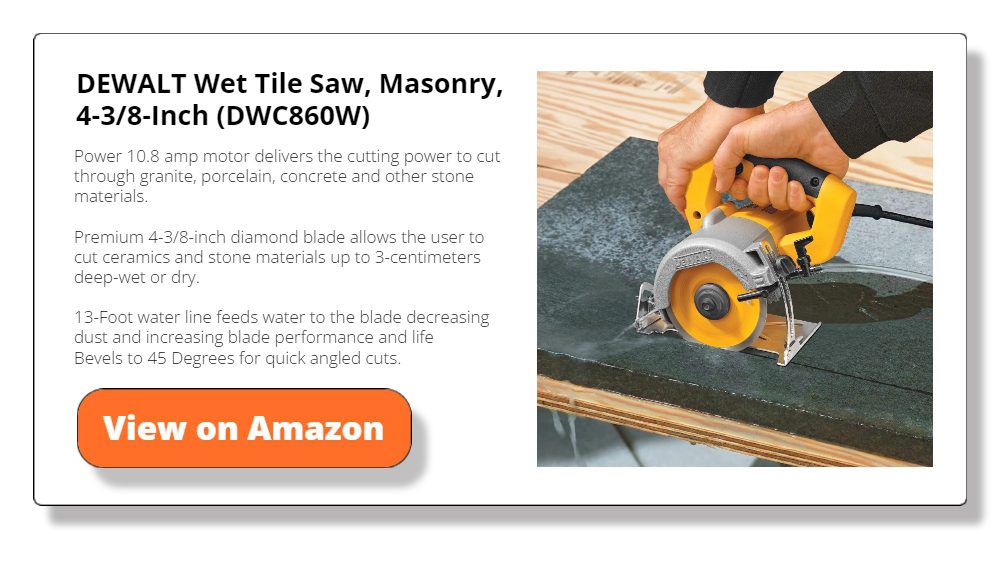
Conclusion
Navigating the world of kitchen countertops may seem daunting at first glance. The journey involves numerous decisions and steps, from material selection to installation and maintenance.
Remember, the perfect countertop for your kitchen is a blend of your personal preferences, budget considerations, and the practicalities of your daily life. Here’s to a kitchen space that truly feels like the heart of your home, blending style, function, and lasting charm!


